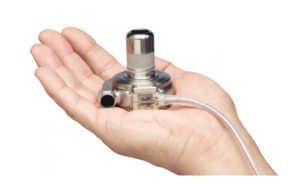
Medtronic’s HVAD [Image courtesy of Medtronic]
In June, Medtronic stopped distributing and selling its HeartWare Ventricular Assist Device (HVAD) system amid a slew of clinical comparisons indicating a higher frequency of neurological adverse events, including stroke and mortality, with the HVAD system. The company had previously recalled the device after 855 complaints and eight injuries related to an issue with the device’s ports in February. In that recall, Medtronic reported 12 deaths among implanted patients, although three weren’t related to the particular issue at hand.
The company also developed a support program for patients who had an HVAD implanted to ensure the ongoing care and safety of such patients, of which there are approximately 4,000. In response to Medtronic taking the HVAD off the market, Abbott (NYSE:ABT) issued a statement confirming that it has the capacity to support the growing demand for mechanical circulatory support devices with its HeartMate 3 heart pumps.
Along with Medtronic’s announcement that it would cease the distribution of its HVAD system, the FDA issued a statement alerting providers to no longer implant the HVAD, with the administration stating that it was working closely with Medtronic to “ensure patient care is optimized” as the device was taken off the market. With its HeartMate 3 heart pumps, Abbott is stepping into the void left by Medtronic’s exit from the LVAD market.
ProPublica’s report alleges that, with failed inspections and HVAD-related deaths continuing to occur, the FDA relied on Medtronic to fix the problems voluntarily instead of instructing them to do so.
According to the report, more than 19,000 patients received the HVAD implant, with a vast majority receiving it after the FDA found that it didn’t meet federal standards in 2014. Medtronic acquired the HVAD through its $1.1 billion acquisition of HeartWare in 2016.
Federal regulators didn’t hand down any penalties as HeartWare, and then Medtronic, issued 15 serious recalls of the device from that 2014 starting point — the most for any single high-risk device in the FDA’s database, the report said.
ProPublica reported that the FDA said it closely monitored issues with the HVAD system — and that after Medtronic acquired HeartWare, there were more than 100 meetings between the agency and the company to ensure that problems were being fixed and safety concerns were reviewed. Additionally, the FDA told ProPublica that it initiated formal reviews of new device modifications and tracked the safety and effectiveness of the HVAD system.
A Medtronic spokesperson shared a company statement with ProPublica that said the medical device giant has taken HVAD problems very seriously — and that the company worked closely with FDA and engaged external experts. Medtronic issued the following statement to Medical Design & Outsourcing:
“Medtronic is dedicated to delivering safe, effective, and reliable healthcare technology to patients around the world.
“The HVAD System is a full-support, durable left ventricular assist device (LVAD) that helps the heart pump and increases the amount of blood that flows through the body in patients with advanced heart failure. It was approved by global regulatory agencies and has been used by healthcare providers to support critically ill patients since 2009. In recent months, after thorough investigation of issues associated with the HVAD, Medtronic became aware of comparative clinical data demonstrating that the HVAD System risk/benefit profile for patients had changed compared to another commercially available LVAD with better clinical outcomes.
“We withdrew the HVAD System from the market in line with our Mission and purpose as a company to deliver patient benefit. Before doing so, we worked closely with the other primary LVAD manufacturer to ensure that alternative options would be available for patients who may be candidates for an LVAD. The decision to withdraw HVAD is consistent with our deeply held commitment to design and manufacture medical technology that improves patient health outcomes.
“Medtronic respects the physician-patient relationship and is focused on working with healthcare providers to ensure that there is no gap in patient care. We are supporting patients implanted with HVAD, as well as their caregivers, through special programs that keep patients and clinicians supported, connected and informed. Clinical and technical teams are and will continue to be available to ensure ongoing patient support. Patients can find more information on our website.
“Medtronic continuously evaluates our devices at each stage of their life cycles to ensure we are meeting regulatory requirements and the evolving needs of patients and the healthcare professionals that serve them. We regularly receive and evaluate real-world information to identify, address, correct, and communicate issues when they arise.”
An FDA spokesperson also issued a statement to MDO:
“The FDA has actively monitored the performance of Medtronic’s HeartWare device since it was approved in 2012. The patients and providers who rely upon this life-sustaining device to treat advanced, end-stage heart failure were always at the forefront of our decision-making. In the last five years, the medical device landscape for patients with end-stage heart failure has evolved through the introduction of an alternative approved device, the Abbott HeartMate 3 Left Ventricular Assist System, which, in recent studies, has been shown to have a lower adverse event rate. The FDA is continuing to work with Medtronic to ensure that all deficiencies are resolved and with Abbott to ensure an adequate supply of HeartMate 3 devices are available for future patients.”



